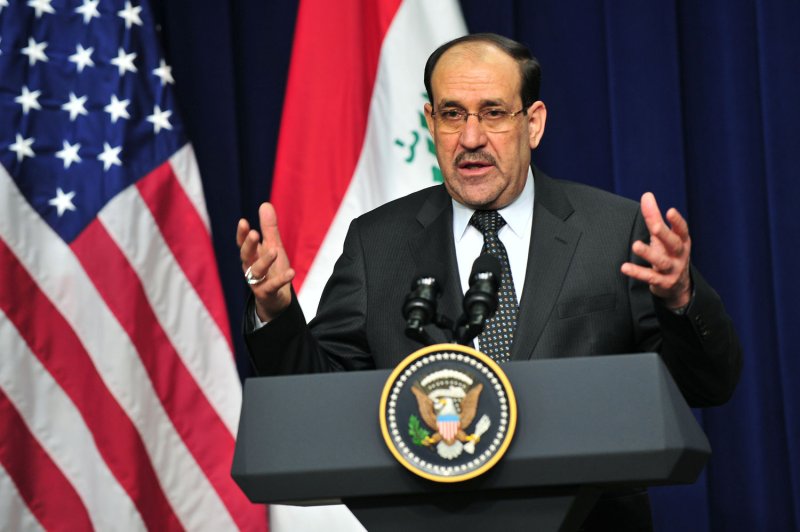Iraqi Prime Minister Nouri al-Maliki speaks during a joint press conference with President Barack Obama in the Eisenhower Executive Office Building in Washington on December 12, 2011. UPI/Kevin Dietsch |
License Photo
BAGHDAD, Dec. 27 (UPI) -- Iraqi lawmakers with ties to rebel Shiite cleric Moqtada Sadr called for the country's parliament to be dissolved and for new elections within six months.
Observers said the incident indicates a growing gap between Sadr and Prime Minister Nouri al-Maliki, also Shiite, and draws attention to the political uncertainty that has enveloped Baghdad since U.S. troops left Iraq more than a week ago, The Washington Post reported Tuesday.
In calling for a new parliament, Baha al-Araji, leader of the Sadrist Trend political bloc, said the government wasn't addressing the country's basic needs.
The call by Sadrists comes after Maliki's domestic security forces accused Tariq al-Hashimi, Iraq's Sunni vice president, of running a hit squad, prompting him to flee.
Omar al-Mashhadani, a political analyst in Baghdad who worked for the Sunni-supported Iraqiya political party, said Sadrists know the long odds against dissolving parliament, but are trying to put some space between themselves and Maliki.
Meanwhile, a radical group -- accused by the United States of receiving training, funds and weapons from Iran and attacking U.S. forces -- said it would enter the political arena and possibly put up candidates, the Post reported.
Vali Nasr, a Tufts University professor and expert on Iraq, told the Post events are combining to form "a complicated mix of inter-Shiite bickering and escalation of Shiite-Sunni fighting."
But all the turmoil could strengthen Maliki's political hand, one analyst said.
"I predict that Maliki might come out of this conflict more authoritarian than ever," said Babak Rahimi, assistant professor of Iranian and Islamic studies at the University of California-San Diego. "Just like 2008, he will again focus on themes of law and security and try to crush or marginalize his rivals."















